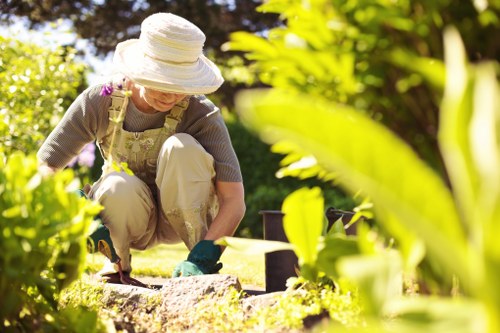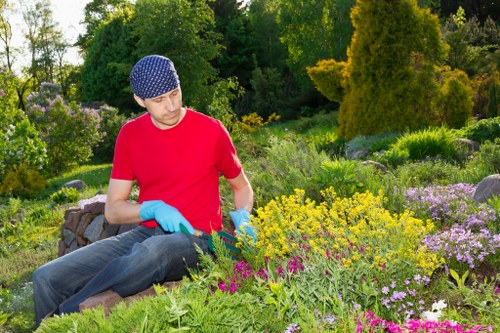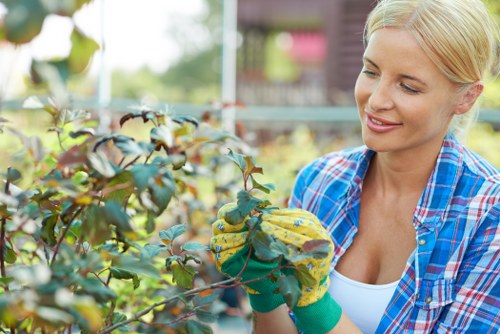Comprehensive Guide to Garden Maintenance in Chingford

Introduction to Garden Maintenance
Maintaining a beautiful garden in Chingford requires dedication, knowledge, and the right resources. Whether you're a seasoned gardener or a beginner, understanding the essentials of garden upkeep can transform your outdoor space into a vibrant and welcoming environment.
The unique climate and soil conditions in Chingford necessitate specific care strategies to ensure that your plants thrive throughout the year. From selecting the right plants to implementing effective maintenance routines, every aspect plays a crucial role in the overall health and appearance of your garden.
In this guide, we'll explore various aspects of garden maintenance tailored to the Chingford area, providing you with the insights and tips needed to achieve and maintain a stunning garden.

Understanding Chingford's Climate and Soil
Climate Considerations
Chingford experiences a temperate maritime climate, characterized by mild winters and warm summers. This climate influences the types of plants that can thrive, as well as the maintenance practices required throughout the year.
During the summer months, gardens in Chingford may require additional watering to cope with the heat, while the cooler, wetter winters necessitate proper drainage and protection against frost for sensitive plants.
Soil Composition
The soil in Chingford varies, with a mix of clay, sandy, and loamy soils found in different areas. Understanding your garden's soil type is essential for selecting appropriate plants and amendments.
Clay soils retain moisture but can become compacted, making drainage an issue. Sandy soils, on the other hand, drain quickly but may require more frequent watering and fertilization to retain nutrients. Loamy soils are ideal for most plants due to their balanced texture and fertility.

Seasonal Garden Maintenance Tips
Spring Maintenance
- Pruning: Remove dead or damaged branches from trees and shrubs to promote healthy growth.
- Soil Preparation: Amend the soil with compost or other organic matter to enrich it for the growing season.
- Planting: Plant new flowers, vegetables, and shrubs, taking into account the climate and soil conditions.
Summer Maintenance
- Watering: Ensure plants receive adequate water, especially during dry spells.
- Weeding: Regularly remove weeds to prevent them from competing with your plants for nutrients.
- Lawn Care: Mow the lawn regularly and consider aerating it to maintain its health.
Autumn Maintenance
- Leaf Removal: Clear fallen leaves to prevent fungal diseases and maintain garden aesthetics.
- Plant Protection: Protect sensitive plants from early frosts with mulch or coverings.
- Tools Maintenance: Clean and store gardening tools properly to extend their lifespan.

Essential Tools for Garden Maintenance
Basic Tools
- Gloves: Protect your hands from thorns, rough materials, and dirt.
- Pruning Shears: Essential for trimming and shaping plants.
- Spade and Fork: Useful for digging, planting, and aerating soil.
Advanced Tools
- Lawn Mower: Keep your lawn neat and healthy with regular mowing.
- Hedge Trimmer: Maintain the shape and size of hedges efficiently.
- Wheelbarrow: Transport soil, plants, and debris with ease.
Maintenance Tips
Regularly clean your tools after use to prevent rust and damage. Sharpen blades as needed to ensure they remain effective.

Plant Selection for Chingford Gardens
Perennials and Annuals
Select a mix of perennials and annuals to ensure year-round color and interest in your garden. Perennials provide long-lasting beauty, while annuals can be changed each season for variety.
Shade and Sun Plants
Consider the light conditions in different parts of your garden when selecting plants. Some plants thrive in full sun, while others prefer shade or partial shade.
Native Plants
Incorporate native plants that are well-adapted to Chingford's climate and soil. They often require less maintenance and are beneficial for local wildlife.
Irrigation and Water Management
Effective irrigation is crucial for maintaining a healthy garden. In Chingford, it's important to balance water usage to prevent both drought stress and waterlogging.
Watering Techniques
- Drip Irrigation: Provides targeted watering to the base of plants, reducing water waste.
- Rain Barrels: Collect rainwater to use during dry periods, promoting sustainable water use.
- Automatic Timers: Ensure consistent watering schedules without manual effort.
Water Conservation Tips
- Mulching: Apply mulch to retain soil moisture and suppress weeds.
- Drought-Resistant Plants: Incorporate plants that require less water to reduce overall consumption.
- Efficient Irrigation Systems: Invest in systems that minimize evaporation and runoff.
Implementing Sustainable Practices
Adopting sustainable water management practices not only conserves resources but also contributes to the long-term health of your garden. Consider integrating rainwater harvesting and smart irrigation technologies to optimize water usage.
Pest and Disease Management
Protecting your garden from pests and diseases is essential for maintaining plant health. In Chingford, common challenges include fungal infections, insect infestations, and rodent activity.
Preventative Measures
- Healthy Soil: Maintain soil fertility to support strong plant growth, making them more resistant to pests.
- Regular Inspections: Check plants regularly for signs of pests or disease to address issues promptly.
- Proper Spacing: Avoid overcrowding plants to improve air circulation and reduce disease risk.
Organic and Chemical Treatments
- Neem Oil: An organic option for controlling a variety of insect pests.
- Insecticidal Soaps: Effective against soft-bodied insects like aphids and mites.
- Fungicides: Use as needed to combat fungal diseases, following label instructions carefully.
Integrated Pest Management (IPM)
Implementing IPM strategies involves combining biological, cultural, and chemical methods to manage pests in an environmentally friendly way. This approach minimizes the use of harmful chemicals while effectively controlling pest populations.
Lawn Care and Maintenance
A well-maintained lawn enhances the overall appeal of your garden in Chingford. Proper care involves regular mowing, feeding, and addressing common lawn issues.
Mowing Techniques
- Height: Set your mower to the appropriate height for your grass type to promote healthy growth.
- Frequency: Mow regularly, removing no more than one-third of the grass blade length at a time.
- Sharp Blades: Keep mower blades sharp to ensure clean cuts and reduce plant stress.
Fertilization and Feeding
- Seasonal Fertilizing: Apply fertilizers according to the needs of your grass type and seasonal requirements.
- Natural Fertilizers: Consider using organic options like compost or manure to enrich the soil naturally.
- Weed Control: Use pre-emergent herbicides to prevent weed growth without harming your lawn.
Addressing Lawn Problems
- Weeds: Identify and remove weeds promptly to prevent them from spreading.
- Pests: Monitor for signs of grubs or other lawn pests and take appropriate action.
- Disease: Treat fungal infections early to prevent extensive damage.
Hardscape and Garden Structures
Incorporating hardscape elements such as paths, patios, and garden structures can enhance the functionality and aesthetics of your garden in Chingford.
Pathways and Walkways
- Materials: Choose from gravel, stone, or paving slabs to create durable and attractive paths.
- Design: Plan pathways to guide movement through your garden and highlight key areas.
- Maintenance: Regularly clear debris and prevent weed growth to keep paths looking neat.
Patios and Outdoor Living Areas
- Seating: Incorporate comfortable seating options to create inviting outdoor spaces.
- Shade Structures: Add umbrellas, pergolas, or awnings to provide shelter from the sun.
- Lighting: Install garden lighting to enhance ambiance and extend outdoor enjoyment into the evening.
Garden Structures
- Greenhouses: Extend the growing season and protect plants with a greenhouse.
- Fences and Walls: Define garden boundaries and add privacy with fences or walls.
- Composting Areas: Set up a dedicated space for composting to recycle garden waste effectively.
Eco-Friendly Garden Practices
Adopting eco-friendly practices in your garden not only benefits the environment but also promotes a healthier and more sustainable outdoor space.
Composting
Composting transforms kitchen scraps and garden waste into valuable organic matter, enriching your soil and reducing landfill waste.
Rainwater Harvesting
Collecting rainwater for irrigation conserves water resources and ensures that your plants receive natural, chemical-free hydration.
Native and Drought-Resistant Plants
Choosing plants that are native to the area or drought-resistant minimizes the need for excessive watering and supports local biodiversity.
Reducing Chemical Use
Limit the use of synthetic fertilizers and pesticides by opting for organic alternatives and encouraging beneficial insects that help control pests naturally.
Professional Garden Maintenance Services
While DIY garden maintenance can be rewarding, professional services offer expertise and efficiency, especially for larger or more complex gardens in Chingford.
Benefits of Hiring Professionals
- Expertise: Professionals bring knowledge of local climate, soil conditions, and plant care.
- Time-Saving: Outsourcing maintenance tasks frees up your time for other activities.
- Quality Results: Skilled gardeners ensure that maintenance is performed to a high standard.
Services Offered
- Regular Maintenance: Routine tasks such as mowing, pruning, and weeding.
- Landscape Design: Planning and implementing garden layouts and plant selections.
- Seasonal Clean-Up: Preparing your garden for changing seasons with appropriate maintenance.
Choosing the Right Service
When selecting a garden maintenance service in Chingford, consider factors such as experience, range of services, customer reviews, and pricing to ensure you find a provider that meets your specific needs.
DIY vs. Professional Maintenance
Deciding between DIY garden maintenance and hiring professionals depends on various factors, including your schedule, budget, and personal preferences.
Advantages of DIY
- Cost Savings: Eliminates labor costs associated with professional services.
- Personal Satisfaction: Achieving results through your own efforts can be highly rewarding.
- Flexibility: Allows you to work at your own pace and prioritize tasks according to your schedule.
Advantages of Professional Services
- Expert Knowledge: Professionals can provide insights and solutions that may not be readily apparent.
- Efficiency: Tasks are completed more quickly and often with better results.
- Comprehensive Care: Access to a wider range of services and tools without additional investment.
Hybrid Approach
Many gardeners find a hybrid approach effective, handling routine tasks themselves while hiring professionals for more specialized maintenance needs.
Maintaining Garden Health
Healthy gardens are less susceptible to pests and diseases and are more enjoyable to spend time in. Maintaining garden health involves a combination of proper plant care, soil management, and environmental considerations.
Soil Health
- Amendments: Regularly add compost or organic matter to improve soil structure and fertility.
- pH Levels: Test soil pH and adjust as necessary to suit the needs of your plants.
- Aeration: Prevent soil compaction by aerating your garden beds.
Plant Nutrition
- Balanced Fertilization: Provide essential nutrients through appropriate fertilizers.
- Organic Options: Utilize natural fertilizers to support sustainable growth.
- Regular Feeding: Ensure timely feeding to meet the nutritional demands of your plants.
Environmental Factors
- Sunlight: Ensure plants receive adequate light based on their specific requirements.
- Water: Maintain consistent watering practices to prevent stress.
- Air Circulation: Promote good air flow to reduce the risk of fungal diseases.
Enhancing Garden Aesthetics
Aesthetic appeal plays a significant role in garden maintenance. By focusing on design elements, color schemes, and plant variety, you can create an inviting and visually pleasing outdoor space.
Design Principles
- Balance: Ensure a harmonious distribution of plants and features throughout your garden.
- Focal Points: Create areas of interest, such as a specimen tree, a water feature, or a colorful flower bed.
- Texture and Color: Combine plants with different textures and colors to add depth and vibrancy.
Plant Variety
- Layering: Use a mix of ground covers, mid-level plants, and tall specimens to create a layered look.
- Seasonal Blooms: Select plants that flower in different seasons to ensure continuous color.
- Complementary Colors: Choose colors that complement each other to create a cohesive palette.
Decorative Elements
- Garden Art: Incorporate sculptures, ornaments, or other art pieces to add personality.
- Lighting: Use garden lighting to highlight features and create ambiance during evening hours.
- Water Features: Add ponds, fountains, or streams to enhance the sensory experience of your garden.
Sustainable Gardening Practices
Embracing sustainability in your garden not only benefits the environment but also contributes to a healthier and more resilient outdoor space.
Composting and Recycling
- Compost Bins: Set up compost bins to recycle garden and kitchen waste into valuable soil amendments.
- Mulching: Use organic mulch to improve soil health and reduce the need for chemical fertilizers.
- Recycled Materials: Incorporate recycled materials in garden projects, such as using reclaimed wood for raised beds.
Energy-Efficient Practices
- Solar Lighting: Utilize solar-powered garden lights to reduce energy consumption.
- Manual Tools: Opt for manual gardening tools over electric ones to minimize energy use and noise.
- Rain Gardens: Create rain gardens to manage stormwater runoff naturally.
Benefits of Sustainability
Implementing sustainable practices leads to a more eco-friendly garden, reduces costs over time, and promotes biodiversity, making your garden a thriving ecosystem.
Conclusion
Effective garden maintenance in Chingford involves a blend of proper planning, regular care, and sustainable practices. By understanding the local climate and soil conditions, selecting appropriate plants, and utilizing both DIY and professional services when necessary, you can cultivate a garden that is both beautiful and resilient.
Investing time and resources into your garden not only enhances its aesthetic appeal but also provides a peaceful and enjoyable outdoor space for you and your community to cherish.
Ready to transform your garden? Contact us today to book your garden maintenance service and achieve the garden of your dreams!